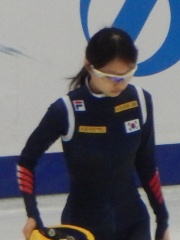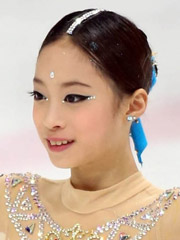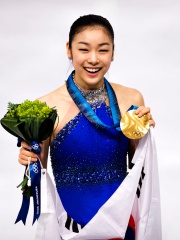
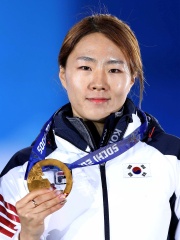

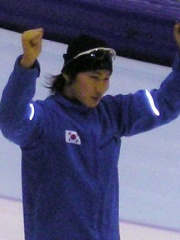



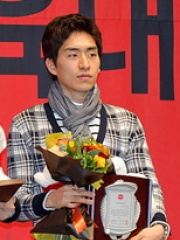
The Most Famous
SKATERS from South Korea
This page contains a list of the greatest South Korean Skaters. The pantheon dataset contains 483 Skaters, 24 of which were born in South Korea. This makes South Korea the birth place of the 8th most number of Skaters behind Japan, and Norway.
Top 10
The following people are considered by Pantheon to be the top 10 most legendary South Korean Skaters of all time. This list of famous South Korean Skaters is sorted by HPI (Historical Popularity Index), a metric that aggregates information on a biography's online popularity. Visit the rankings page to view the entire list of South Korean Skaters.

1. Yuna Kim (b. 1990)
With an HPI of 54.33, Yuna Kim is the most famous South Korean Skater. Her biography has been translated into 44 different languages on wikipedia.
Yuna Kim (Korean: 김연아; born September 5, 1990), also credited in eastern name order as Kim Yuna or Kim Yeon-a, is a South Korean figure skater. Known for her well-rounded skills, achievements, popularity, and impact on the sport, she is one of the most highly recognized athletes in South Korea and regarded as one of the greatest figure skaters in history, being commonly referred to as "Queen Yuna". Kim started skating at five years old and competed in women's singles from 2001 to 2014. She is the 2010 Olympic champion, the 2014 Olympic silver medalist, a two-time World champion (2009, 2013) the 2009 Four Continents champion, a three-time Grand Prix Final champion (2006, 2007, 2009), the 2006 World Junior champion, the 2005 Junior Grand Prix Final champion, and a six-time South Korean national champion (2003–2006, 2013, 2014). Kim never finished off the podium in her competitive career, becoming the first South Korean figure skater to medal at the Olympic Games, World Championships, ISU Grand Prix, and ISU Junior Grand Prix. She won every major international competition in the course of her career and is a former record holder in all three competition segments in women's singles under the ISU Judging System having broken world records 11 times. She was the first woman to score above 150 points in the free skating segment and 200 points in the combined total score. Kim is noted for her rivalry with three-time World champion Mao Asada from Japan, with whom she headlined women's skating for two Olympic cycles until the 2014 Winter Olympics in Sochi. After her retirement from competitive figure skating in 2014, Kim was instrumental in the successful bid to bring the 2018 Winter Olympics to her home country in Pyeongchang. She also had a successful professional skating career, producing and appearing in several ice shows such as All That Skate. With her various sponsorships, Kim remained one of the highest-paid athletes in South Korea even well into her retirement. She was included in the Time magazine's annual list of the World's 100 Most Influential People in 2010 and in several Forbes lists.

2. Lee Sang-hwa (b. 1989)
With an HPI of 44.22, Lee Sang-hwa is the 2nd most famous South Korean Skater. Her biography has been translated into 25 different languages.
Lee Sang-hwa (Korean: 이상화; Hanja: 李相花, Korean pronunciation: [i.saŋ.ɦwa]; born 25 February 1989) is a South Korean retired speed skater who specialises in the sprint distances. She is a two-time Olympic champion in 500 metres (2010 and 2014) and the 2010 World Sprint champion. She was the world record holder in women's 500 metres with the time of 36.36 seconds set in Salt Lake City on 16 November 2013, and held the South Korean record on 1000 metres from March 2009 until January 2024. She has also won three World Championships medals in 500 metres, and has placed in the top three in World Cup events four times in this distance. Her first World Cup victory, however, came on the non-Olympic distance 100 metres. On the 1000 metres, however, she has never placed higher than fifth in international events (2010 World Sprint Championships, first 1000 metres).

3. Chun Lee-kyung (b. 1976)
With an HPI of 43.61, Chun Lee-kyung is the 3rd most famous South Korean Skater. Her biography has been translated into 17 different languages.
Chun Lee-kyung (Korean: 전이경; Hanja: 全利卿; born January 6, 1976, in Okcheon, Chungcheongbuk-do) is a retired South Korean short track speed skater. She is a four-time Olympic Champion and three-time Overall World Champion for 1995–1997. She was a dominant force in International Short Track Speed Skating during the mid-1990s. Chun took part in the 1992 Winter Olympics in Albertville, France, at the age of 15, but failed to win much attention. In 1994, however, Chun won two gold medals at the Lillehammer Winter Olympic Games. She won the women's 1000 m final, defeating the reigning World Champion Nathalie Lambert and former World Champion Kim So-hee, and was part of the team that won the 3000 m relay in a world record time along with Kim. Between 1994 and 1998 Winter Olympics, Chun won the Overall World Championship three times in a row, in 1995, 1996 and 1997 (becoming the second person to have won three consecutive Overall World Championships). She shared the 1997 title though with Yang Yang (A), her most significant career rival. She also won the Overall World Cup title for 1997–1998 season. In 1998, at the Nagano Winter Olympics, Chun successfully defended both of her Olympic titles, by defeating China's Yang Yang (A) and Yang Yang (S) in the 1000 m final after trailing for most of the race. Yang Yang (A) crossed the line together with Chun in what was ruled and reviewed as a photo finish, but was then disqualified for cross tracking Chun at the very end as Chun tried to pass on the inside (although the photo finish seemed to show Chun having defeated her for the gold regardless). She led the relay team to another Olympic victory with world record time, completing the first "double-double" in Olympic short track history. She also added a 5th Olympic medal, a surprising bronze in the 500 metres, her weakest event and which she had never won a World Championship medal in. She was advanced to the bronze after winning the B final, due to a major fall in the A final leading to the disqualification of Isabelle Charest, and the refusal to finish of Wang Chunlu. She became the first quadruple Olympic Champion in Short Track Speed Skating and the first one from Korea. One month later at the 1998 World Championships, her final major international meet, Chun won 4 medals including her 3rd title at 3000 metres, but was still narrowly denied a 4th consecutive Overall World Championship by Yang Yang (A) (the 2nd of Yang Yang (A)'s own 6 consecutive titles, after having tied Chun for the 97 title). The key event to the final overall result was the 1000 metres, where just as in Nagano Chun and Yang Yang (A) crossed in a virtual dead heat over the distance, but this time with Yang emerging the victor and getting the crucial 1st place points to the overall title with it. This provided the final chapter to the intense rivalry of the 2 all-time greats, as Chun would retire immediately after the meet. In 2002, Chun was elected to the Athletes' Committee of the International Olympic Committee.

4. Lee Kang-seok (b. 1985)
With an HPI of 42.60, Lee Kang-seok is the 4th most famous South Korean Skater. His biography has been translated into 18 different languages.
Lee Kang-seok (Korean: 이강석; Hanja: 李康奭, born 28 February 1985) is a South Korean speed skater. He is the 2007 and 2009 World Champion for 500 m. At the 2006 Winter Olympics, he won a bronze medal in the 500 m. He is the second South Korean person to win a medal in an event outside of short track speedskating, and he has become a representative to show that South Korea is expanding towards cultivating their athletes to excel in sports other than short track speed skating. On 5 March 2006, Lee won his first World Cup title, winning the 2005–06 World Cup on the 500 m. A year later, Lee won gold at the World Single Distance Championships in the Utah Olympic Oval, setting a world record time of 34.25 seconds in the second race. The record has been broken since then by Jeremy Wotherspoon on 9 November 2007, with a time of 34.03 seconds. At the 2009 Winter Universiade in Harbin, China, Lee won the 500 m, beating Yu Fengtong with times of 35.00 and 34.82.
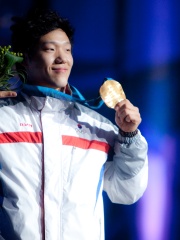
5. Mo Tae-bum (b. 1989)
With an HPI of 41.64, Mo Tae-bum is the 5th most famous South Korean Skater. His biography has been translated into 24 different languages.
Mo Tae-bum (Korean: 모태범, Hanja: 牟太釩; Korean pronunciation: [mo.tʰɛ̝.bʌm]; born 15 February 1989) is a South Korean speed skater. He is the 2010 Olympic Champion and the 2012 and 2013 World Champion in 500 m. He started speedskating while in the third grade. Prior to the 2010 Winter Olympics, Mo won two distances at the 2006 World Junior Speed Skating Championships. He has competed on the national level since 2004 and has competed internationally since 2005. He won two Junior World Championships in 2006, but did not win any other events until 2009. In 2009 he won gold in the 1000 m and 1500 m events at the Winter Universiade. The international community gave him little attention before the 2010 Winter Olympic Games, but he became the first Korean to win a gold medal in a long track speed skating event as well as earning the silver medal in the 1000 m race. This was a large upset, as he was ranked fourteenth in the world in the 500 m race. Lee Myung-bak congratulated Mo for his achievements in speed skating following these wins.

6. Lee Jung-su (b. 1989)
With an HPI of 40.03, Lee Jung-su is the 6th most famous South Korean Skater. His biography has been translated into 19 different languages.
Lee Jung-su (Korean: 이정수; Korean pronunciation: [i.dʑʌŋ.su]; born November 30, 1989) is a South Korean short track speed skater. He is a two-time Olympic Champion from 2010 Winter Olympics. Lee won one distances and became second overall at the 2008 World Junior Championships in Bolzano. He won 2009–2010 Overall World Cup. At the 2010 Olympic Winter Games in Vancouver, Lee won two gold medal in the 1000m and 1500m events.

7. Jin Sun-yu (b. 1988)
With an HPI of 39.92, Jin Sun-yu is the 7th most famous South Korean Skater. Her biography has been translated into 20 different languages.
Jin Sun-Yu (Korean: 진선유; Hanja: 陳善有, born December 17, 1988, in Daegu, South Korea) is a South Korean short-track speed skater. She is a triple Olympic Champion from 2006 and a three-time Overall World Champion (for 2005–2007). She was the winner of the gold medal in the 1500 meters and the silver medal in the 1000 meters at the 2005 World Championships, as she ended up as the overall champion. At the 2006 World Championships, Jin won the 1000, 1500, and 3000 meters on her way to a second consecutive overall championship. She also finished first in the overall World Cup standings for the 2005–2006 season. At the 2006 Winter Olympics, she won three gold medals, winning women's individual 1000 meters, and 1500 meters events, and as a member of the South Korean women's victorious 3000 meter relay team. In doing so, Jin became the first athlete (by less than half an hour) from Korea to win three gold medals in one Olympics. Ahn Hyun-Soo matched Jin's achievement later by helping Korea to win men's 5000 meters relay.

8. Lim Hyo-jun (b. 1996)
With an HPI of 39.68, Lim Hyo-jun is the 8th most famous South Korean Skater. His biography has been translated into 21 different languages.
Lin Xiaojun (Chinese: 林孝埈; pinyin: Lín Xiàojùn), born Lim Hyo-jun (Korean: 임효준; Hanja: 林孝俊, born 29 May 1996), is a South Korean-born Chinese short track speed skater. He is the 2018 champion of the Men's 1500 m event in short track speed skating at the Winter Olympics, and also set the new Olympic record for the event. Originally starting as a swimmer, Lim took up skating at a young age. Despite multiple injuries early on in his career, he notably won gold at the 2012 Winter Youth Olympics upon his international debut in the Boys' 1000 m event. He would later win the 1000 m and 1500 m events in the Budapest leg of the 2017–18 ISU Short Track Speed Skating World Cup and earn selection for the 2018 Winter Olympics in Pyeongchang. Upon his Olympic debut, Lim won the gold medal, setting a new Olympic record of 2:10.485 in the process, beating Lee Jung-su's previous record set at the 2010 games.

9. Lee Seung-hoon (b. 1988)
With an HPI of 38.98, Lee Seung-hoon is the 9th most famous South Korean Skater. His biography has been translated into 22 different languages.
Lee Seung-hoon (Korean: 이승훈; Korean pronunciation: [i.sɯŋ.ɦun]; born 6 March 1988) is a South Korean speed skater. He won a gold medal in the 10,000 metres, a silver medal in the 5000 meters at the 2010 Winter Olympics, becoming the first and only Asian man ever to achieve these feats, a gold medal in mass-start at the 2018 Winter Olympics, a gold medal in the mass start at the 2016 World Championships in Kolomna, and a bronze medal in mass-start at the 2022 Winter Olympics. He was a short track speed skater, winning the 2008 World Championship 3000 m super-final and three gold medals at the 2009 Winter Universiade. Lee converted to long track in September 2009, as he failed to earn his spot on the South Korea national short track team in the national trials.

10. Kim Dong-sung (b. 1980)
With an HPI of 38.69, Kim Dong-sung is the 10th most famous South Korean Skater. His biography has been translated into 15 different languages.
Kim Dong-Sung (Korean: 김동성; Hanja: 金東聖, born 9 February 1980) is a South Korean former short track speed skater. He won a gold medal in 1000m race and silver medal in 5000m relay at the 1998 Winter Olympics. He has been a two-time Overall World Champion in 1997 and in 2002 and two-time Overall World Cup Champion (1999-2000, 2001-2002).
People
Pantheon has 24 people classified as South Korean skaters born between 1976 and 2004. Of these 24, 24 (100.00%) of them are still alive today. The most famous living South Korean skaters include Yuna Kim, Lee Sang-hwa, and Chun Lee-kyung. As of April 2024, 6 new South Korean skaters have been added to Pantheon including Kim Yun-mi, Ko Gi-hyun, and Jeon Da-hye.
Living South Korean Skaters
Go to all RankingsYuna Kim
1990 - Present
HPI: 54.33
Lee Sang-hwa
1989 - Present
HPI: 44.22
Chun Lee-kyung
1976 - Present
HPI: 43.61
Lee Kang-seok
1985 - Present
HPI: 42.60
Mo Tae-bum
1989 - Present
HPI: 41.64
Lee Jung-su
1989 - Present
HPI: 40.03
Jin Sun-yu
1988 - Present
HPI: 39.92
Lim Hyo-jun
1996 - Present
HPI: 39.68
Lee Seung-hoon
1988 - Present
HPI: 38.98
Kim Dong-sung
1980 - Present
HPI: 38.69
Kim Yun-mi
1980 - Present
HPI: 37.30
Choi Min-jeong
1998 - Present
HPI: 37.26
Newly Added South Korean Skaters (2025)
Go to all RankingsKim Yun-mi
1980 - Present
HPI: 37.30
Ko Gi-hyun
1986 - Present
HPI: 37.10
Jeon Da-hye
1983 - Present
HPI: 36.36
You Young
2004 - Present
HPI: 33.39
Lee Yu-bin
2001 - Present
HPI: 31.99
Chung Jae-won
2001 - Present
HPI: 30.65


